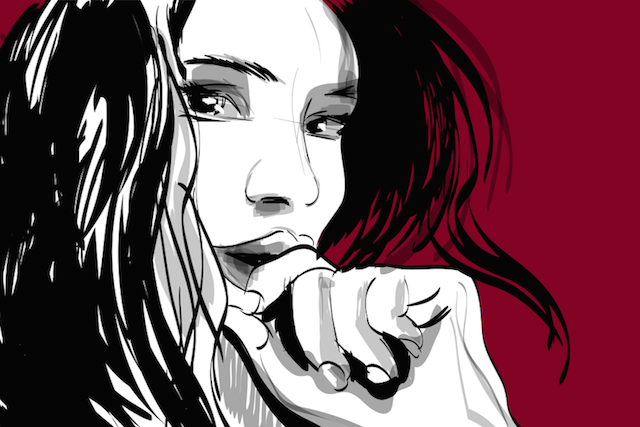
“Judging is preventing us from understanding a new truth. Free yourself from the rules of old judgments and create the space for new understanding.” ~Steve Maraboli
For a long time, I was a judgmental person. I would look at other people walking along the street—who had no idea I was even paying them any attention—and make all kinds of comments based on their appearance, their dress sense, the way they talk, walk, their weight—anything that took my fancy.
“She shouldn’t be wearing that skirt—it’s too short.”
“She should focus on losing weight, not scarfing down that bar of chocolate.”
“Her hair’s such a mess. Why doesn’t she comb it or something?”
The list of secret and harsh criticism was endless, but I didn’t think I was doing any harm. They didn’t know what I was saying about them, and I’m sure some of them would have had a few choice words to say about me, had they found out.
That may have been true, but what was the reason behind my unnecessary tearing down of these other people? It’s not as if they had done anything to me. They were simply going about their own business.
I didn’t think about why I was doing it. If you asked me at the time, I would have answered something along the lines of “because they should/shouldn’t be doing ‘that thing.’ ” I thought I was perfectly within my rights to make judgments about them and think exactly what I wanted to think.
And yes, up until today, I still think whatever I want—I’m entitled to have my own opinions after all, but I’m making more of a conscious effort not to be so unkind about people who do things differently. Truth be told, I’m human, so it’s not always the easiest thing in the world, but making that decision has given me a freedom I never expected.
Back then, after all the judgment and cruel comments flowed effortlessly from my mouth while I was out and about, I would go back to the comfort of my home. Only, as comfortable as I felt inside the safety of my own home, there was a distinct level of discomfort I felt within myself.
Watching TV, I would see women that I thought were beautiful, smart, or simply doing well in life, and the comparing would start. All of a sudden, I was stupid or ugly or failing miserably at being a woman and a mum more than ever.
When looking at myself in the mirror, I would see my entire body covered in unwanted imperfections: the wobbly thighs, the seemingly endless stretch marks, the not-flat-enough stomach, and the butt that was becoming closer and closer friends with gravity.
I disliked myself on a major scale. I didn’t think I was good enough, and as harsh as I was to the people out there on the street, I was exactly the same to myself.
I was unkind and cruel and I mentally beat myself up every single day. The only difference between what I said about people and what I regularly said about myself was that I could hear it—there was no escape.
It took many years to finally reach a point in my life where I could be honest about the reason I was choosing to be so mean. It was a hard pill to swallow, which is often the case when it comes to the truth. I wanted to ignore it and I tried my hardest but once I came to the realization, I had no other choice but to accept it.
Putting other people down made me feel better about myself.
“If I were that size, I would exercise every day.”
“If I had legs like that, I’d wear trousers.”
“I wouldn’t step out the house with such messy hair…”
By making them wrong for being who they were, I somehow gave myself a temporary boost—a feeling of being okay—because I apparently knew what the correct behavior was to undertake in each of their situations and they didn’t have a clue.
In those moments, I became everything I thought I wasn’t: clever, a great mother, a beautiful woman. I couldn’t see or feel those qualities within myself, so I had to use what I considered another person’s faults as the way to reach a point where I could give myself permission to briefly bask in the qualities I thought were lacking.
From then on, every time a thought about someone entered my mind, I would immediately go to work drowning out the words with lots of pleasant thoughts about that person instead. I no longer wanted to be that other kind of person; I wanted to enjoy being me and know I had lots of great qualities without having to latch onto what I perceived as something bad in others.
But that proved to be mentally exhausting. There were so many thoughts flying in that I thought I’d never stop being that person after all. I was so used to making ongoing comments about other people that it’s as if a tap had been turned on and it was now stuck.
But I wasn’t going to give in. I wasn’t prepared to continue as normal now that I could clearly see the reasons behind my behavior, so I changed my approach.
I started to let the thoughts come in and pass as best I could. I purposely paid them little to no attention. This immediately felt easier—no trying to swap them quickly with something else, no fighting, no resisting…
And that’s when I felt the unexpected benefit of freedom, a newly formed space in my mind that wasn’t being taken up with unfair comments. By not holding on to those thoughts, I believed them less and less and in turn, I was able to accept what I saw in front of me—another person living their life in the best way they could in that moment.
If they’re getting on with their life and doing no harm, then let them be. They are who they are and I am who I am. That doesn’t mean I feel this way every time. There are some days where I hold on to those thoughts like they’re the last ones I’ll ever have—until I catch myself days later.
So no, it’s not all rainbows, unicorns, sunshine, and flowers all day, every day.
The most important thing is that in the moments when I become aware that I’m holding on to unkind thoughts about someone a bit too much, I understand that it’s not really about them, it’s about me and the way I’m feeling about myself.
And that acts as my reminder to get and stay on my side so that I can continue to see the best in who I am.
If you ever find yourself being overly critical about someone—especially someone you don’t know—ask yourself why you feel the need. What’s stopping you from accepting a person exactly as they are?
We certainly need to be discerning, for example, between right and wrong, but is it otherwise fair to make people wrong for being different than us or not living their lives in accordance with our ideals?
The more we give a person space to be who they are, the more we give ourselves permission to be who we are.
About Denise McKen
Denise runs The Added Sugar-Free Woman Well-Being Network Facebook group for women who want to embrace their humanness and live an unpressured sugar-free life. You can also hear from her bi-weekly direct to your inbox: www.TheSugarFreeLife.club.
- Web |
- More Posts













 Though I run this site, it is not mine. It's ours. It's not about me. It's about us. Your stories and your wisdom are just as meaningful as mine.
Though I run this site, it is not mine. It's ours. It's not about me. It's about us. Your stories and your wisdom are just as meaningful as mine.
I like to celebrate all of our differences. To learn and teach from them.
What a fantastic post, Denise! And so, so very true! I too have had those unkind thoughts about others in order to feel better about myself. I think this is why humans love reality TV shows so much. It gives us licence to criticise people who are too beautiful or not beautiful enough, too rich, to socially unacceptable, and in turn we think “at least I’m not like THEM!”
I have found one thing that helps me is when I think a negative thought is to let it pass through my mind them immediately think of a positive one about that person. A lot of times I see someone with…questionable fashion sense and immediately think “do they not have a mirror at home!” but then think, “you know, they are wearing something because THEY like it, not to fit some fashion norm, and that takes guts! You go girl!” Not only do I see the person with a different set of eyes, but I have started to notice a drop in my own negative criticism.
Thank you for your post Denise! Lets let everyone celebrate their own differences!
Thank you Melanie!
Competition. Between each article that appear here there is severe healthy competition. What to select as the BEST one? Each one will fail in selecting. How to choose the best Gold? Or say, platinum of this modern world! 16, or 18, or 22, or 24C, nothing is sufficient to grade here.
Only conclusion for this article is, is there anyone who can not accept the view?
If there is some one, he definitely indicates clearly of crossing of ALL borders around all. Thank you.
Judging comes from our ego. It makes us feel better than other people and it creates an imaginary division that would not have otherwise existed. But realizing it for what it is is liberating so that we can focus more on loving than judging.
Beautifully said…
I had a hard time believing my family did not like me… so I kept on contacting them and getting “snubbed”.. over and over again… till one of them finaly got back to me.. BUT I was still angry.. so I was mean to them…. I had not got over the hurt. SO I proved them right the first time…lol
It takes practice to disidentify with your ego. And it is a journey we all must take. We must realize how dysfunctional it is in order to transcend it.
In haste, as I’m about to go to work! 😆
Try the Metta Bhavana meditation. It helps us think and feel more kindly to others. 😉
Thank you for the recommendation!
You will know who you are when you judge others and speaking about who think they are. It’s all quite simple – it’s all a projection. Noticing how you’re judging can teach self-awakening
GREAT post and message, thank you so much for this reminder, and perspective! 🙂
I’m not judging others. I was raised to comb my hair and put clothes on before I leave the house. I think it is a matter of respecting yourself, as well as others to do those things. I’m not even suggesting putting on makeup or actually styling hair….just looking like you(or I) didn’t roll out of bed. It takes all of 30 seconds to put nonpajama pants on and maybe 60 to comb hair.
Remember, what might seem a small 30 second step for you, might appear a mountain to someone else.
OMG! lol Yes, for many people grooming is a matter of self respect, and I guess for you particularly. Grief and Depression causes people to stop grooming. Maybe it’s not really a matter of self-respect for some, it’s basic grooming instincts gone wrong. You never know what is going on in their life, even if you think they are just lazy, you don’t know that for sure. When you think you do then Bam! You just judged someone.That’s what it means to judge others.The sentences following the first are all about judging people (they don’t have self-respect!). It’s OK and normal to think that, but let go of the thoughts immediately after they arise. Don’t write about how important appearances are to you, and wonder why can’t everyone be like you, and think you are not judging.
with contamination ocd it can take me 4 hours to shower and dress… i can leave the house after this with unbrushed hair as the brush is contaminated, wearing what look like clothes i shouldnt leave the hous ein as everything else is contaminated. i look like i havent taken any time or effort, when actually ive spent more time and energy than most. dont assume that brushing hair and putting on certain clothes is easy
Forgiveness is our function as the lights of the world 🌍
We’re all in this together 👨👩👧👦
Thank you for this great message. I think judging makes other people to feel better.
– Gustavo Woltmann
A great post that is so relevant to something I’m experiencing right now. Thank you for sharing.
Aghhhhhh!!!! It’s so painful yet empowering to realize that it’s truly all about ourselves! When we stop judging others so harshly we also stop judging ourselves. Great article on a great topic! Thank you.
Judging other make us feel better. Remember the saying “when you point a finger to other four finger actualy pointing yourself” whenever jugdement come to your thought is the time when your dislike and unsatisficed about yourself so to compensate it your unconscious mind start to jugde other people.
Love is the only way to get a better life.
Remember this:
Love is a VERB not a Feeling. Don’t shy and timid to admit and face ur inner fear, take action to love yourself more on whatever you doing now and you will start loving other people.
(people will also start loving you too)
Simply an outstanding, wonderful read.
(Insert applause here)
Woa, I never think in this way: judging others is damaging self-love.Thank for the post Denise McKen. It is open my mind
very interesting! <3